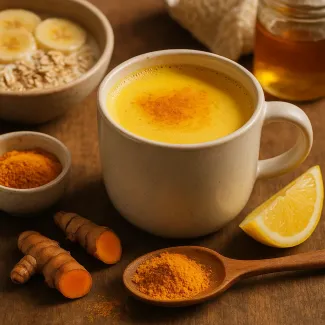
Natural ways to manage cortisol for women over 30
How daily habits and targeted supplements help restore hormonal balance
Cortisol, often referred to as the stress hormone, plays a vital role in how our bodies respond to physical and emotional challenges. However, when cortisol levels remain high over extended periods, they can lead to a range of health issues, especially in women over 30 who may already be navigating hormonal changes, increased responsibilities, and a shifting biological landscape.
This article explores how certain natural supplements can help regulate cortisol in women over 30 and how daily habits, nutrient balance, and stress-reduction techniques work synergistically with these supplements to support hormonal health. We’ll delve into the most relevant adaptogens, vitamins, amino acids, and herbal remedies that are not only popular among women, but also show promise in everyday use for promoting calmness, energy balance, and resilience.
Understanding cortisol and its impact on women in their 30s
Cortisol is produced by the adrenal glands and is closely tied to the body's circadian rhythm, blood sugar regulation, energy production, and immune function. Women in their 30s often face increased cortisol production due to lifestyle stressors like demanding careers, parenting, irregular sleep patterns, and the onset of perimenopausal fluctuations. This makes them more susceptible to symptoms of chronic stress, such as fatigue, mood swings, weight gain (especially around the abdomen), insomnia, and lowered immunity.
When cortisol remains elevated, it begins to affect the hypothalamic-pituitary-adrenal (HPA) axis, creating a hormonal imbalance that can worsen over time. This disruption can contribute to thyroid imbalances, progesterone deficiency, and menstrual irregularities, making stress management and cortisol regulation not only helpful but essential for overall well-being.
The role of supplements in supporting cortisol balance
The strategic use of supplements can help buffer the physiological effects of stress and reduce cortisol levels in the bloodstream. These supplements don’t act as magic pills but support the body’s natural capacity to regulate stress, improve mood, and balance hormones when used consistently and as part of a comprehensive wellness routine.
Let’s take a closer look at some of the most effective supplements known for their cortisol-lowering effects, particularly tailored for women over 30.
Adaptogens that support the stress response system
Adaptogens are natural substances, often plant-based, that help the body adapt to physical, mental, and emotional stress. They work by modulating the release of stress hormones, particularly cortisol, and restoring balance to the adrenal system.
Ashwagandha
One of the most widely used adaptogens, ashwagandha helps regulate the nervous system and stabilize cortisol production. Women who experience mental fatigue, irritability, or restless sleep often report noticeable benefits from consistent ashwagandha use. It's particularly effective when taken in the evening or during high-stress periods.
Rhodiola rosea
Rhodiola supports the body’s resilience to stress and is known for improving mental clarity, physical stamina, and mood stability. It helps reduce the feeling of being “wired but tired,” a common symptom among women in their 30s dealing with adrenal fatigue.
Holy basil
Also known as tulsi, holy basil is a gentle adaptogen that helps reduce anxiety levels and supports stable energy throughout the day. It is especially beneficial for women who experience emotional stress and mild depressive symptoms associated with high cortisol.
Vitamins that reduce stress and support hormonal function
Proper vitamin intake plays a crucial role in helping the body buffer stress and maintain hormonal equilibrium. Women over 30 may become deficient in certain vitamins due to poor absorption, lifestyle habits, or increased nutritional demands.
Vitamin B complex
The B-vitamin family, especially B5 (pantothenic acid) and B6 (pyridoxine), are essential for adrenal function and neurotransmitter production. Supplementing with a high-potency B-complex supports the body’s stress response and reduces feelings of mental overwhelm and tension.
Vitamin C
A potent antioxidant, vitamin C is also vital for cortisol regulation. The adrenal glands have one of the highest concentrations of vitamin C in the body, and regular supplementation helps reduce cortisol spikes, especially during periods of chronic stress.
Vitamin D
Low vitamin D levels are often linked to depression, anxiety, and fatigue. For women living in northern climates or spending limited time outdoors, a vitamin D3 supplement can help improve mood, energy, and hormonal balance.
Minerals that influence cortisol regulation
Certain minerals are integral to the proper functioning of the adrenal glands and nervous system, and they can play a direct role in how the body handles stress.
Magnesium
Magnesium is one of the most crucial minerals for reducing stress-induced tension. It helps quiet the nervous system, support deep sleep, and reduce muscle tightness. Forms like magnesium glycinate and magnesium threonate are particularly calming and effective for nighttime use.
Zinc
Zinc is involved in over 300 enzymatic reactions and supports immune resilience, mood balance, and hormonal signaling. Chronic stress can deplete zinc levels, so replenishing this mineral can contribute to stabilizing cortisol rhythms.
Amino acids and neurotransmitter support
Certain amino acids help support neurotransmitter production, which in turn balances mood and stress response. These are often helpful when cortisol levels are high due to chronic anxiety or sleep disturbances.
L-theanine
Naturally found in green tea, L-theanine promotes a state of calm alertness without drowsiness. It increases alpha brain waves, helping to reduce cortisol while enhancing focus and mental clarity.
GABA (gamma-aminobutyric acid)
As a calming neurotransmitter, GABA helps reduce nervous tension, lower excitatory stress signals, and encourage restorative sleep. While the body produces GABA naturally, supplementation can be supportive when stress depletes natural levels.
5-HTP
A precursor to serotonin, 5-HTP supports mood and helps reduce emotional eating—a common behavior among women experiencing high cortisol. By boosting serotonin, it indirectly helps stabilize cortisol levels.
Herbal supplements and teas that promote calm
Herbs and botanicals have long been used in traditional wellness systems to combat stress and restore emotional balance. While they may be gentle, their effects accumulate over time, offering sustainable cortisol support.
Lemon balm
Lemon balm has a mild sedative effect and is particularly helpful for women who experience restlessness or insomnia. Taken as a tea or tincture, it eases nervous tension and helps regulate nighttime cortisol.
Chamomile
Known for its calming qualities, chamomile supports the parasympathetic nervous system, helping the body move out of a stress state. It is especially effective when cortisol spikes interfere with sleep initiation.
Passionflower
Often used in herbal preparations for anxiety relief, passionflower calms racing thoughts and may reduce cortisol-driven agitation. It works well in combination with other calming herbs like lemon balm and valerian root.
Lifestyle synergy: habits that support cortisol reduction
While supplements are powerful allies, their effectiveness multiplies when combined with daily habits that support parasympathetic dominance (the state of relaxation and recovery). Women over 30 can benefit significantly from integrating the following into their routine:
- Sleep hygiene: Prioritizing 7–9 hours of deep, uninterrupted sleep is key to resetting cortisol rhythms. Avoiding blue light exposure before bed and keeping a consistent sleep schedule is crucial.
- Blood sugar balance: Eating regular meals that include protein, healthy fats, and complex carbs prevents cortisol spikes triggered by low blood sugar.
- Movement and exercise: Gentle workouts like walking, yoga, or Pilates help regulate cortisol, while overtraining or high-intensity intervals may increase it.
- Breathwork and mindfulness: Simple practices like deep diaphragmatic breathing or guided meditations activate the vagus nerve and promote relaxation.
- Limit caffeine and alcohol: These substances can overstimulate the adrenals and exacerbate cortisol imbalances, especially when consumed in excess or during times of stress.
The hormonal connection: cortisol, estrogen, and progesterone
For women over 30, the interaction between cortisol and sex hormones becomes increasingly significant. Chronic cortisol elevation can disrupt estrogen-progesterone balance, contributing to PMS symptoms, irregular cycles, and early perimenopause. Supporting cortisol with the right nutrients not only helps manage stress but can also lead to improved menstrual health, libido, and emotional stability.
Signs your cortisol may be too high
Women often overlook early signs of elevated cortisol, attributing them to a busy lifestyle. Recognizing the body’s cues can help determine when supplements and lifestyle changes are needed.
- Persistent midsection weight gain
- Frequent waking at 3 a.m.
- Feeling tired but wired in the evenings
- Mood swings or irritability without clear triggers
- Increased cravings, especially for sugar or salty snacks
- Hair thinning, especially around the crown
If several of these symptoms are present, addressing cortisol should be a priority in your wellness strategy.
How to build a supplement routine that works
To get the most from cortisol-lowering supplements, consistency and timing are key. Most adaptogens work best when taken at the same time daily—often in the morning for energy or in the evening for calm, depending on the herb’s action. Vitamins like B-complex and vitamin C are water-soluble and can be taken with meals. Magnesium and calming amino acids may be best suited for evening use to support relaxation and sleep.
It’s also helpful to start with one or two supplements, observe how your body responds, and add others slowly if needed. Pairing supplements with nutritional support, stress reduction techniques, and adequate hydration leads to more reliable and sustainable results.
When to seek personalized support
While many women benefit from general-use supplements, it’s important to listen to your body and consider speaking to a qualified health practitioner if symptoms persist or worsen. Cortisol dysregulation can overlap with other conditions like thyroid dysfunction, insulin resistance, or low progesterone, which may require personalized protocols.
By integrating the right natural supplements, making thoughtful lifestyle adjustments, and staying attentive to the body's needs, women over 30 can regain control over their stress response, reduce cortisol, and cultivate a balanced, energized, and resilient daily rhythm.





